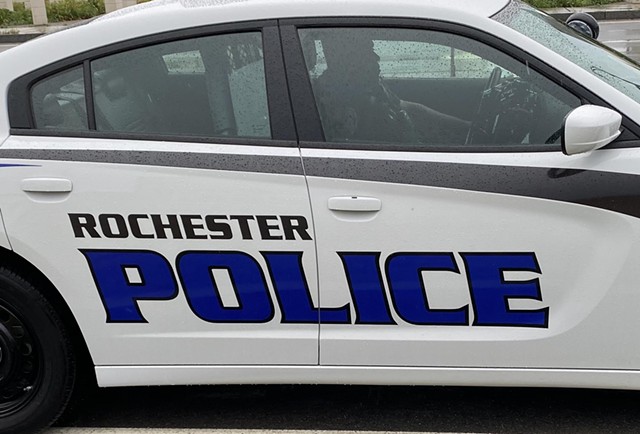
- PHOTO BY JAMES BROWN, WXXI NEWS
- A police officer inside a Rochester Police Cruiser.
The reforms were compiled by a working group assembled by the Warren administration in response to an executive order from Gov. Andrew Cuomo that required all municipalities to submit a plan for reforming their police departments by April 1. The proposed reforms fall into several categories, including police accountability, officer recruitment, and mental health call responses.
“Our community is committed to reimagining and improving policing,” Warren said in a prepared statement. “There’s certainly more work to be done. However, we have made real change before and I know we can do so again.”
The proposals are currently in draft form. Warren and the working group will be holding public feedback sessions as they finalize the plan the city will submit to the state.
The proposals largely touch on topics and issues that have been frequently brought up by activists, community leaders, and elected officials, including the mayor, although focus on some of them intensified following the death of Daniel Prude at the hands of Rochester police officers.
They include:
- Banning the use of chemical irritants when a person is restrained, tear gas or other chemical weapons for crowd control of peaceful protests, the use of chemical irritants on a person 15 or under, and of handcuffing of a child 12 or under, unless they are a threat to themselves or others. Other less-than lethal weaponry, like long range acoustic devices (LRADs), will receive a cost-benefit analysis.
- Conducting annual psychological screenings of officers to ensure they are fit for duty.
- Petitioning the state to amend two key labor laws so that the city could fire Rochester Police Department personnel immediately for cause and enable the city to negotiate a brand new contract with the police union.
- Aiming to reduce the size of the Rochester Police Department within the next 5 to 10 years to free up funding that can be directed to other areas.
- Considering the hiring a commissioner of public safety, who would have final say over budgets.
- Supporting the passage of Daniel’s Law, state legislation that Assembly member Harry Bronson and state Sen. Samra Brouk plan to introduce. If passed, the law would set up a system to coordinate how police work with mental health professionals and non-police crisis response teams. Its goal is to shift the handling of mental and behavioral health calls toward practitioners and away from police.
- Increasing funding for programs that place social workers, mental health providers, and other non-police personnel alongside officers. The city and police department have been blasted repeatedly for using law enforcement to handle mental or behavioral health crises. Those criticisms have intensified following Prude’s death and a recent incident where a police officer pepper- sprayed a 9 year old girl.
- Advocating for more funding to support evidence-based mental health, youth recreation, anti-violence, and conflict resolution programs.
- Expanding the Rochester Police Department’s Open Data Portal and other data sharing programs to provide more information on types of police-citizen interactions, demographic information pertaining to police responses and interactions, officers’ use of force, and other categories.
- Expanding the Rochester Police Department’s Open Data Portal and other data sharing programs to provide more information on types of police-citizen interactions, demographic information pertaining to police responses and interactions, officers’ use of force, and other categories.
- Funding more immersive training methods to help officers better understand how systemic racism and structural oppression influence policing practices, as well as creating and enforcing disciplinary rules to combat racism, misogyny, and homophobia.
- Considering the appointment of a chief resiliency officer for the Rochester Police Department who would be tasked with developing programs to help officers better manage the stress of police work. The position would be modeled on an effort started by New Jersey Attorney General Gurbir Grewal.
- Developing a policy to limit the use of spit socks or spit hoods and outline guidelines for their use. The department’s use of spit socks came under scrutiny following Prude’s death. Police body camera footage of the incident showed officers placing a spit sock over Prude’s head before restraining him.
- Advocating for New York law to require that the state’s basic course for police officer certification include training in explicit and implicit bias, systemic racism, cultural competency, and procedural justice.
The plan will be submitted back to the four organizations, where further opinions will be brought to the working group. Input from the public is also encouraged before the final plan is submitted to City Council on March 4.
"We're asking you, the citizens, the people of Rochester to review this document and provide your input to us," Warren said, in a presentation of the plan Thursday evening.
The entire 688-page document can be read here.
Jeremy Moule is CITY's news editor. He can be reached at [email protected]. Gino Fanelli is a CITY staff writer. He can be reached at (585) 775-9692 or [email protected].
